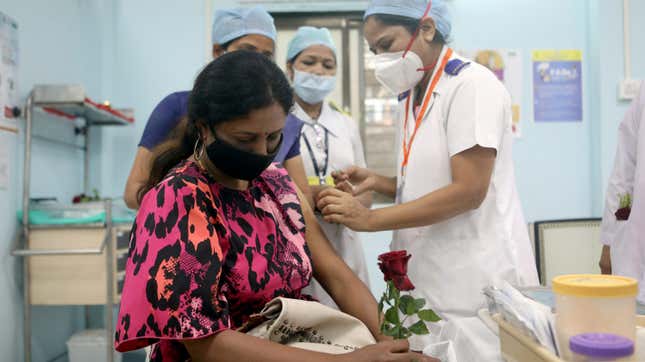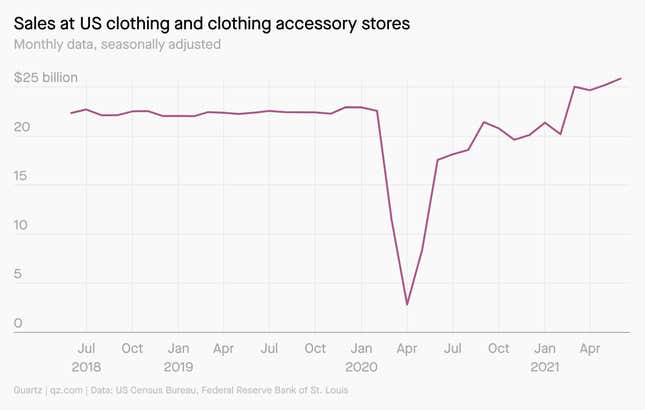Hi Quartz readers,
After a slow start, China’s mass vaccination campaign has gathered pace thanks to benefits and incentives from local governments, including deploying a popular girl band as vax ambassadors. By the end of June, 630 million people in China had received at least one shot—more than 40% of the population, according to the country’s health authority. By comparison, 48% of the US population was fully vaccinated by July 13, and nearly 56% had received at least one shot.
But as concerns about the Delta variant grow in China, many local governments are turning to stricter policies to get more shots in arms.
Guiping, a city in China’s Guangxi autonomous region, said this month that all adults without exemption-worthy health conditions must be vaccinated by the end of August, according to state-owned news outlet the Paper (link in Chinese). If parents or family members of students aren’t fully vaccinated by the time school starts in September, those students’ admission could be delayed. Unvaccinated residents will also be prevented from entering hospitals, libraries, and museums. Beiliu, another city in Guangxi, issued a similar notice, as did Sichuan, Zhejiang, and Jiangxi.
It’s unclear if such policies can really be enforced, or how on board Beijing is with their implementation. China’s top health office has said the government respects citizens’ decisions around vaccination, and authorities have urged some local governments to halt “inappropriate measures” to make vaccination compulsory. But China doesn’t have many national policies pushing its vaccination drive, leaving a great deal up to local authorities.
On Weibo, there is already a strong backlash against the Guangxi cities’ measures. “So shameless, using kids to threaten us,” one comment reads. Says another: “They have started to force us, just like when they did for the family planning policy.” —Jane Li
Seven talking points
🇫🇷 China isn’t alone in its vaccine crackdown. French president Emmanuel Macron said special COVID-19 passes will be required starting in August to enter restaurants and shopping malls, and to get on trains and planes.
📈 5.4% inflation is no reason to panic. June’s US consumer price increase was the highest since 2008, but the Federal Reserve is still betting this inflation will be transitory.
🥇 Covid-19 has come to the Olympics. A string of athletes have dropped out of the Tokyo Games due to Covid-19 restrictions, injuries, or for mental health reasons. (Want more Olympics intel? Sign up for our pop-up guide here.)
👻 Ghost kitchens are coming to life. As restaurants rethink their business models post-Covid, many are turning to commercial kitchens with no storefronts attached.
🤝 How to take a meeting in a work-from-anywhere world. Public spaces like coffee shops, restaurants, and libraries are becoming increasingly important as hybrid work takes off.
🍕 Dining out is getting expensive, fast. In the past year, the cost of meals made at home increased 2% in the US, while the costs of eating out rose 9%.
🧺 There are lessons in how inflation gets measured. We built an interactive tool to show how each country’s “basket” of goods and services reflects its cultural patterns.
Watching the waves
Experts are still debating the number of cases caused by India’s tragic second wave, but speculation is already rife about the timing and magnitude of a third. Three factors are likely to determine when and how severely it hits:
- Individual choices. Will India see a return of the kind of behavior seen in the second wave, when large crowds participated in super spreader events?
- Vaccination coverage. The country has provided single-dose coverage to more than 22.4% of its citizens, and full coverage to just 5.3%.
- Variants. The second wave was a result of more infectious variants like Alpha and Delta appearing in India, hastening Covid-19’s spread.

Dressing up
Sales at US clothing and accessory stores were 47% higher in June than the same time last year—when Covid-19 was slamming fashion sales—and 15.5% higher than in June 2019. The question is whether they can stay there.
“You can see pretty clearly the boost to clothing sales from the $1,400 checks in March along with the reopening of physical retail stores,” one economist told Quartz. “There is probably room for some further above-trend spending as consumers make up for last year, but as those one-time boosts fade I would expect clothing sales to fall back a bit.”

You asked
Why is it so expensive to rent a car right now?
Right!? In June, it was about 88% more expensive to rent a car or truck in the US than during the same time last year. And while that’s in comparison to a period when the pandemic shut down much of the country, forcing rental prices down, the figures are still 76% higher than in June 2019.
The pandemic has a lot to do with it. Amid last year’s travel freeze, rental companies shed a large number of cars from their fleets in an effort to survive. Now Americans are ready to start moving again, but those same companies are finding cars in short supply, thanks largely to a shortage of semiconductor chips. One analyst described it as an “extreme example of supply and demand.”
Car rental, like the airline and hotel industries, relies on dynamic pricing, which makes the fallout from supply-and-demand issues immediate. Because rental companies have a fairly fixed amount of stock, the more Americans try to get cars, the higher prices will go.
Elsewhere on Quartz:
- China is diverting IPO windfalls from the US to Hong Kong.
- Private jets will be taxed under the EU’s new climate plan.
- Why Jeff Bezos sent himself to space, and why we should care.
- China’s new carbon market isn’t designed to fix climate change.
- Fintech startups could make or break Africa’s new free-trade area.
- Is complaining about colleagues fireable? Netflix says yes.
Our best wishes for a healthy day. Get in touch with us at needtoknow@qz.com, and live your best Quartz life by downloading our iOS app and becoming a member. Today’s newsletter was brought to you by Jane Li, Marc Bain, Shahid Jameel, and Kira Bindrim.
